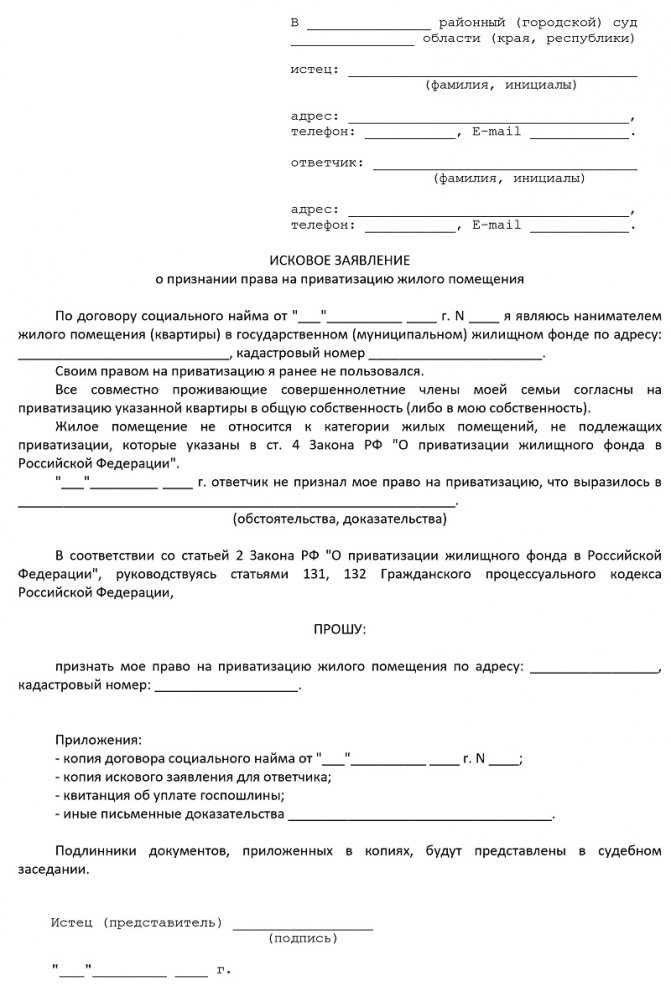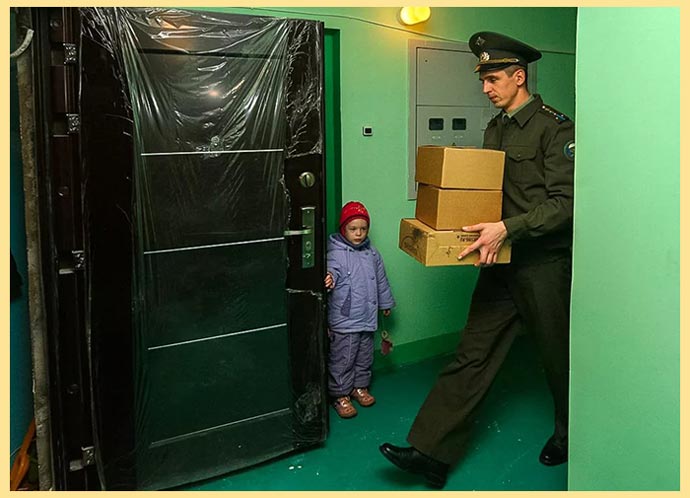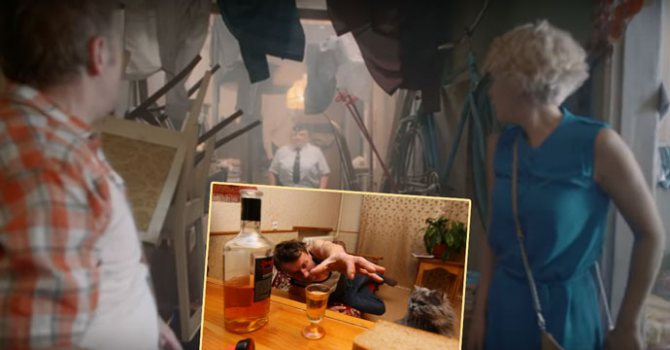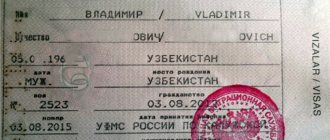Is it possible to privatize a dorm room?
The question of the possibility of privatization of such real estate is quite controversial. On the one hand, in accordance with Article 4 of Law No. 1541-1, privatization is impossible. On the other hand, if we take Article 7 of the RF Housing Code as a basis, it is still possible to obtain such an object in your own. But only if certain conditions are met.
Prerequisites
Article 4 of Law No. 1541-1 states that it is impossible to privatize residential premises located in dormitories. And in Article 7 of the Housing Code of the Russian Federation there is a note that rooms in dormitories are subject to rules common to all, but only on the condition that the buildings themselves where the housing is located are transferred to the jurisdiction of the municipality. Thus, privatization will be possible if:
- The building was transferred to the balance of the local administration.
- The residents entered into a social rental agreement.
- The room is a separate living space, equipped with load-bearing walls and having a separate entrance.
Even under such conditions, there are still premises that cannot be privatized: a kitchen, a bathroom, a shower room, and so on. In general, any premises that are common to everyone in the hostel. At the same time, residents of privatized rooms retain their rights to use them on the same basis and to the same extent as everyone else.
How to privatize a dorm room through the court
Currently, cases of refusal to privatize rooms in dormitories by the owners of the property, namely municipal authorities . Property owners can:
- Offer citizens to buy their homes or move out.
- Deliberately delaying the transfer of the hostel from the owner organization to the balance of the municipality.
- Refuse to enter into social rental agreements with residents.
The above circumstances create illegal obstacles for citizens to realize their housing opportunities. To protect violated rights in the field of privatization of real estate, employers can go to court.
To apply to the courts , persons living in the room must take the following actions:
- Submit a written application to the authorized body of the municipality in order to exercise your right to free privatization.
- Receive a refusal from the housing department to transfer ownership.
- Afterwards, file a claim demanding recognition of the authority of ownership of the relevant property.
In addition to the statement of claim, the following documents :
- refusal of the municipality;
- social tenancy agreement (if any);
- identity documents of all privatization participants, including minors;
- power of attorney for a representative;
- statements of personal account and house register and other information that will be requested by the court.
Upon receipt of a judicial decision in favor of the plaintiff (permitting the privatization of housing) and the collection of all necessary documents, the resulting ownership right is subject to mandatory state registration.
In accordance with Art. 333.33 of the Tax Code of the Russian Federation, claims for recognition of property rights are subject to a state duty for citizens in the amount of 300 rubles.
Arbitrage practice
Judicial practice that has developed in the field of protecting the housing rights of citizens violated by the refusal to privatize indicates that the courts usually take the side of the tenant in their decisions.
Example
Citizen M lived in a room in a dormitory owned by a commercial organization. In October 2014, Citizen M became aware that ownership of the house had been transferred to local authorities, the tenant approached the municipality to conclude a social rental agreement, and in response he was offered to buy the house. Citizen M filed a claim with the court, which, by a final decision, obliged the municipality to formalize a social tenancy agreement, since Citizen M promptly paid utility bills for the disputed residential premises, that is, he fully fulfilled the obligations stipulated by the social tenancy agreement.
Citizens, when turning to judicial authorities, can act independently or through a representative (lawyer). The services of an intermediary will require additional costs, but will allow you to competently and in accordance with the current rules of law protect your violated rights.
A court decision entailing recognition of the right to privatization, or a court ruling to force local authorities to conclude a social tenancy agreement is the basis for the transfer of ownership of a room in a dormitory.
Reasons for privatization
What is the reason to privatize a dorm room? Everything is quite simple: residents who have not registered ownership rights do not have the opportunity to do anything with the property in principle. They cannot sell it, remodel it (even if this is quite difficult in small rooms), pass it on by inheritance, rent it out, and so on.
Thus, in order to get all the listed opportunities, residents must go for privatization. Yes, this is not the easiest and fastest procedure, and it also involves certain costs (although it is considered free). However, the end result is worth it.
Example : Let’s assume that members of his family lived with a tenant who entered into a social rental agreement, but were not officially registered in the premises. If he dies, the room will go to the municipality and, as a result, will be transferred to another tenant. Of course, he will not be interested in living with complete strangers and they will have to move out, because they have no rights to the room. In the case of privatization of real estate, the room is inherited on a general basis and becomes the property of family members as first-line heirs.
Advantages and disadvantages of privatization
What are the pros and cons of privatizing a dorm room? They are identical to those that arise when privatizing an apartment or any other similar property:
| Advantages | Flaws |
| Can be sold. | You will have to pay property taxes. |
| Can be rented out. | |
| Can be passed on by inheritance. | |
| You can do redevelopment. | If you do not pay the loan, for which this housing is collateral, there is a risk of losing it. |
| You can register (and deregister) anyone you want, without regard to the municipality. | |
| Can be pledged. |
Most often, residents of dorm rooms pay special attention to the opportunity to sell their housing or pledge it as collateral. Rooms of this type are not the most successful type of real estate. And while it is still suitable for students or single people, married couples want their own apartment or house. By selling a room in a dorm or pledging it to a bank, you can get the necessary amount to realize your dream.
How to privatize a dorm room
Let's take as a basis the fact that the hostel in which the room planned for privatization is located has been transferred to the balance of the municipality. In all other cases, it will not be possible to obtain housing ownership.
If the building is not transferred to the ownership of the municipality, then it is actually the private property of the university, factory or any other organization to which it belongs. It is impossible to privatize private property, otherwise any tenant could take away the apartment from its owners absolutely free of charge.
Order, stages
Where to start privatization? The first step is to find out the most important point: on whose balance sheet the building is listed. And, as mentioned above, only if the building belongs to the municipality does it make sense to take further actions. Otherwise, privatization will simply be refused.
- Obtain consent for privatization from all residents registered in this room (if there are any). This should even include children 14 years of age and older.
- If one of the residents does not agree to participate in the procedure, he can write a refusal to participate in privatization.
Such a refusal implies a complete loss of the rights of this person to the part of the real estate assigned to him. If a person categorically disagrees with privatization itself (does not want to participate in it, but does not agree to write a refusal), then all that remains is to negotiate and convince him. There are no other options. If this is not done, privatization will be refused.
- Prepare all the necessary documents (see below for more details).
- Submit an application to the local municipality or the “My Documents” branch (formerly MFC).
- Sign the privatization agreement.
- Register ownership in Rosreestr.
Once residents become owners of a dorm room, they can dispose of the property in any legal way. There are no restrictions on the length of residence or other problems associated with the fact that this property was previously owned by the municipality.
Procedure
The easiest way to determine the current owner of the house (and, as a result, of this apartment) is to look at this information in the utility bill. If the municipality is indicated there, you can move on. If there is some other enterprise/factory/university/company, then you will first have to wait until the premises are transferred to the balance of the administration of the locality.
Next, you need to immediately discuss the situation with other residents of the room (not the entire dormitory, but only this room). Usually it is enough to clearly explain all the advantages of privatization and consent will be obtained.
If a person has already participated in privatization before or fundamentally does not want to deal with this issue (at the same time he agrees to lose his share), you can get a notarized refusal from him. In the case when a person refuses to agree (or refuse) to privatization, he will have to be persuaded, make concessions, and so on.
Example: A tenant has previously participated in privatization and understands that immediately after registration of ownership by other persons, he may be “asked” to move out. And he has nowhere else to go. He refuses privatization to other persons until they give him guarantees that immediately after privatization this person will be given a share equivalent to that which the other owners will receive.
The collection of documents is described in more detail below; it is worth noting that this stage is the longest and most difficult. If a person is not a specialist lawyer, then he simply does not know where and why to apply. He also has no idea what specific deadlines are required for the preparation of various papers, how long they are valid, and so on. As a result, due to the lack of such information, the procedure is extended for a considerable period.
You can always issue a power of attorney to a representative lawyer who will deal with this issue. This will save a lot of time and effort.
After all the documents have been collected, you need to contact “My Documents” or the local administration. There is virtually no difference, except that through “My Documents” it is much easier to formalize privatization, but somewhat longer. There you will have to write a statement. It is no different from those drawn up during the privatization of an apartment.
Privatization of a dorm room
All the nuances of the privatization of dorm rooms are related to the specific status of such housing. A few years ago, such a procedure was prohibited by law, but with the introduction of the new Housing Code it became available to the population.
Currently, the following practice is widespread: tenants of dorm rooms are refused privatization; instead, they are offered to buy the premises at the average price on the market. But such actions are not entirely legal.
What could be the reasons for refusal of privatization:
- the applicant did not pay bills for services;
- An illegal redevelopment of the room was discovered;
- the documentation provided by the applicant has lost its legal force;
- the applicant provided false documents;
- an incomplete set of documentation was provided.
Also, the refusal may be due, for example, to the fact that the hostel was not transferred to the municipality, but is still listed on the balance sheet of the enterprise. In some cases, municipal authorities are delaying the process of concluding social rent agreements with citizens, thus postponing the privatization procedure.
However, these and other circumstances should not interfere with the implementation of the rights of citizens to the free privatization of dorm rooms.
Under a social tenancy agreement
At the legislative level, it is possible to privatize a hostel in which the applicant occupies a room on the basis of a social tenancy agreement. To register property rights, a citizen must contact the administration to draw up a social tenancy agreement. After this, you will need to obtain a certificate certifying the status of the object.
To carry out the procedure for re-registering a room as a property, a citizen must obtain consent from all family members, including minor children.
In student
Student dormitories are classified as special purpose housing. This imposes a ban on the registration of rooms as property. There are no exceptions to this rule, so a person can only find another object for privatization.
If several people live
Cases of privatization of rooms in which more than one person lives are quite controversial. Initially, such rooms were provided to citizens in the form of “beds”. This means that one premises can be legally occupied by several people at the same time.
The issue of privatization of such an object depends on whether it is actually currently occupied by these persons.
If a room is occupied by several people, even the court does not have the right to infringe on the rights of other citizens by providing the room to only one person.
In this situation, you will need to conclude a social rental agreement. Then the court has the opportunity to recognize the ownership of the room for several citizens. In this case, we will talk about shared ownership.
The court can assign housing to one citizen, if at the time of the application he actually lived in the room alone.
Read what documents are needed to privatize a summer cottage. Do you need a sample application for privatization of an apartment? See here.
Documentation
To privatize a dorm room, you need to prepare the following package of documents:
| Document | Peculiarities |
| Consent to privatization from residents | They are compiled independently, even before the procedure begins. |
| Refusal to participate in privatization | If you want to. Must be certified by a notary. Otherwise it is not valid and will cause refusal. |
| Passport of a citizen of the Russian Federation | Copies of all pages are required. It is recommended to make copies even of those that do not contain information. It’s also worth making 3-4 copies at once, just in case. |
| Extract from the Unified State Register of Real Estate | Issued by Rosreestr or “My Documents”. At the moment, it replaces a certificate stating that the person did not participate in privatization, as well as a registration certificate for the room. |
| Social tenancy agreement | The original is required, but it is recommended to make at least 1 copy. |
| Extract from the personal account of the room | Needed to prove that there is no debt on the room (for example, rent). May cause refusal. |
| Extract from the house register | Indicates the number of persons registered in the premises. |
| Power of attorney for a representative | If you want to. It must also be certified by a notary. Otherwise it has no force. |
| Permission from guardianship authorities | This is only relevant if a minor is registered in the room. |
In some cases, additional documents may be required. It is recommended to clarify this point separately, at the stage of drawing up the application.
The procedure for privatizing a dorm room
Citizens of the Russian Federation living in dormitory rooms belonging to the housing stock of state or municipal authorities, on the basis of social rental agreements, have the right to privatize this housing subject to a certain legal order:
- It is necessary to find out information about whether the property belongs to local governments. To do this, you should submit a request to the housing department of the municipality, which will provide information on the composition of municipal property.
- Collect a package of documents that will be required to conclude a transaction to transfer ownership of a residential premises.
- The collected information is sent to the local branch of the regional government (city administration, district department for housing policy and housing stock).
- After checking the received documentation, a decision is made to refuse or permit privatization.
If the housing department of the municipality refuses to transfer ownership of the property occupied by the hostel, the tenant has the right to appeal such a decision in court.
What documents are needed to privatize a room?
To complete a privatization transaction, is mandatory to collect the following package of documents:
- Application for the provision of public services.
- Identification documents of privatization participants (passport, birth certificate of minors).
- Social tenancy agreement.
- A certificate confirming the fact that the citizen has not previously privatized residential property is provided by the Bureau of Technical Inventory (BTI).
- A certificate indicating that the privatization participants do not have personal housing. Information can be obtained from the branch of the Unified State Register of Rights to Real Estate and Transactions with It (USRP).
- Extracts from the house register and the personal account of the property. They are issued at local departments of housing and communal services (HCS).
- Technical passport obtained from BTI.
Additionally, you may need the following information:
- Power of attorney for a representative. The document must specify the rights of the person to provide, sign and receive a privatization agreement.
- Passport details of the authorized person.
- If the tenants of the privatized residential premises are recognized as partially capable or incompetent , a court decision is required confirming the recognition of the persons as such.
- Consent to privatization received from the guardianship and trusteeship authorities, if a minor citizen is registered in the room.
- Certificate of marriage (divorce).
- Refusal to participate in privatization of persons registered in residential premises who do not want to become property owners. The refusal must be notarized.
The collected documents are submitted to the city administration or the housing department of the municipality - in person, and if such a possibility is provided, then in electronic form.
If a social tenancy agreement has not been concluded
To privatize a room, a citizen of the Russian Federation must use this residential premises on the basis of a social tenancy agreement . However, a situation may arise when the relevant document is missing , in which case the person will have to take the following actions:
- It is necessary to find out whether a rental agreement was previously concluded; it is possible that the document was drawn up, but was lost, or was not drawn up at all.
- It is worth contacting your local municipality housing department for information.
- To restore or conclude a contract, certain information will be required: a statement of the established form;
- passport details of all employers and family members of the applicant, birth certificates of minors;
- extracts from personal accounts and from the house register;
- decisions of an authority to provide housing on the basis of social rent or a warrant.
Verification of submitted documents takes no more than one month . For persons who have a warrant (giving the right to move into and live in an apartment), the period may be reduced.
The delivery of documentation is confirmed by a receipt from the housing department, and after checking the information, an agreement is issued, which is signed by the tenant and the authorized body.
What to do if refused
If the refusal is justified, then the first step is to clarify what exactly went wrong. The most popular reasons:
- Some documents are missing or there are errors in them. The solution is simple - collect the necessary documents or correct them.
- The room has been remodeled. This is prohibited, so you will have to return everything to its previous state.
- The room does not belong to the local municipality or is generally excluded from privatization. Nothing can be done about this.
There can be a huge number of unfounded reasons, and that’s why they are unfounded. The solution in all cases is the same - go to court. It should be borne in mind that some of the conditionally unfounded (from the point of view of the law) demands may well be taken into account by the court and therefore its decision is unlikely to satisfy potential owners of the premises.
Example : Rent debts are not formally a reason for refusal, but in fact they become the most common reason. The main problem here is that during privatization, the entire debt will remain with the municipality, which it cannot do. As a result, even when solving the problem through the court, you will have to take on this debt: pay it off in advance or transfer it to a new owner. It is impossible not to pay and still get the room as your own. In the most extreme case, the municipality can simply terminate the social tenancy agreement based on the tenants' failure to fulfill their obligations to pay for utilities. And this automatically deprives a person of the right to privatize this property.
Procedure
If the reason is not justified, then you need to act as follows:
- Demand the refusal of privatization in writing with a specific indication of the reason.
- Submit an application to the court.
- Wait for the meeting and decision.
- Act in strict accordance with the decision.
It must be taken into account that often the decision does not come into force immediately, but after a month, which gives the defendant the opportunity to file an appeal.
Procedure
The procedure is not complicated. The most important document here is a written refusal to privatize. If it is not there, you need to demand it. If they refuse to issue it, then you should contact management or make a video recording of such a violation. In any case, in addition to this, you need to prepare a passport, a social tenancy agreement and documents confirming the fact that the applicant really tried to privatize the apartment.
They need to go to court (not forgetting to pay the state fee) and explain the current situation. If the reason was truly unfounded, the court will willingly side with the applicant and demand that the administration take appropriate action (in our case, issuing permission for the privatization procedure).
Statement

Price
When submitting an application, you must attach a receipt for payment of the state fee. These are the only costs in this case. The state duty is 300 rubles, since the claim relates to non-property claims.
Deadlines
The law does not specify specific deadlines, but in practice we can conclude that on average about 2 months pass from the moment the claim is filed until the date of the hearing. However, this is not the upper limit. If the court’s workload is high, or the very essence of the request turns out to be very controversial, then the date may be set 4-5 months after the documents are submitted.
Privatizing a dorm room is a complex procedure, primarily due to problems with belonging to the administration, as well as collecting documents. At a free consultation, lawyers will clarify the main controversial issues, and they can also act as representatives of the client.
FREE CONSULTATIONS are available for you! If you want to solve exactly your problem, then
:
- describe your situation to a lawyer in an online chat;
- write a question in the form below;
- call Moscow and Moscow region
- call St. Petersburg and region
Save or share the link on social networks
Author of the article
Natalya Fomicheva
Website expert lawyer. 10 years of experience. Inheritance matters. Family disputes. Housing and land law.
Ask a question Author's rating
Articles written
513
- FREE for a lawyer!
Write your question, our lawyer will prepare an answer for FREE and call you back in 5 minutes.
By submitting data you agree to the Consent to PD processing, PD Processing Policy and User Agreement
Useful information on the topic

Eviction from a mortgaged apartment
One of the ways to get your own home if you don’t have sufficient funds...

1
Eviction from the hostel
If a person does not have his own housing, he is forced to look for an alternative….

3
Eviction of minor children from residential premises
Minors are one of the most vulnerable categories, until they reach adulthood...

1
How to evict alcoholic neighbors
Neighbors leading an antisocial lifestyle mean constant noise, brawls,...

Privatization of a house with land
Privatization has been going on in the country for many years now and...

Privatization of apartments, housing
Privatization of housing is one of the few ways to officially and...








